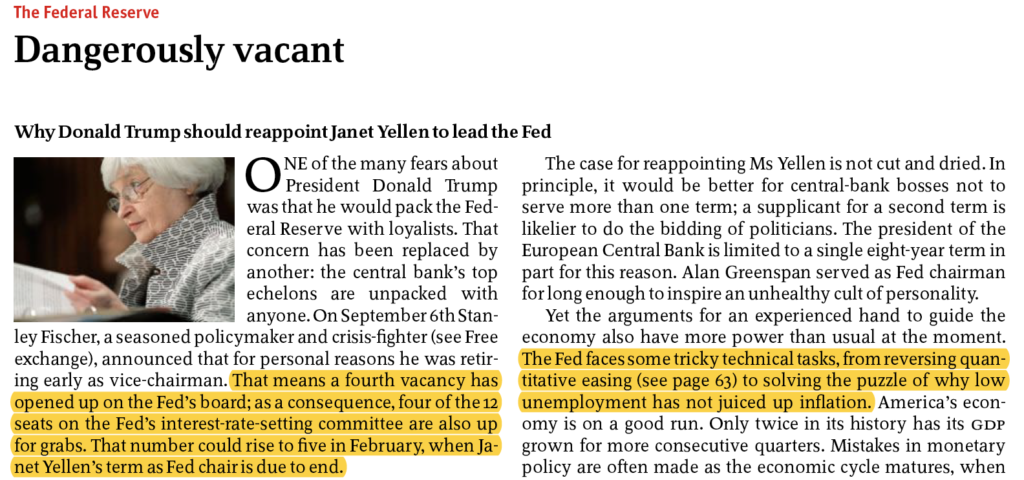The Case of the Fed
The U.S. Federal Reserve is set to announce a multi-year plan tomorrow to shrink its balance sheet of $4.5-trillion of assets, which are amassed from series of Quantitative Easing following the 2008 financial crisis. The process will start gradually, depending on housing arrangement and refinance, according to The Economist.
In the latest issue of The Economist, an article titled “Dangerously Vacant” suggests that Trump should reappoint Janet Yellen to be the Chair of the Board of Governors of the Federal Reserve System. Yellen’s term as Chair will end in February, which means that four of the 12 seats of the FOMC, the Fed’s committee that sets interest rates, will be vacant. The article argued for the reappointment of Yellen because it would provide efficiency for future directions and make the vacant posts easier to fill. The Fed’s future tasks will be tricky, according to the article. The Fed will focus on reversing the effects of quantitative easing and to solve the puzzle of why low unemployment has not juiced up inflation.
In the classic Keynesian structure of macroeconomics, monetary policy is the wheel that pushes the economy forward in times of recession. In a Global economy, Keynesian policies seem problematic. The Fed’s policy will send a signal to Central Banks worldwide, leading to simultaneous shrinking.
What exactly does this new cycle mean to the Global Economy? To understand this, we must start by looking into the effects of QE. One hypothesis is that QE can bring down long term interest rates, and thus increasing investment. But skeptics argue that it’s a game of managing trader’s expectations for short-term rates and the extension of which produces money, i.e, money producing money. If this scenario is true, then there will be no guarantee of a bright economical future due to the fact that what moves money around is not products but blind optimism. Claudio Borio, an economist in Bank of International Settlements, said on Financial Times that bonds and equity prices are beyond their fundamental values, and thus they could struggle to repay when rates rise. Moreover, amid this huge bubble of pure guesswork and hyperbole of values, companies are less likely to increase investment because of a small margin of error. Thus, Central Banks will have to decide to get rid of QEs, and the time for the Fed is now.
Exactly what is “faith in the economy” triggers my curiosity. It seems that the economy right now is “the blind led by the blind”—no one knows what’s going on so why not just follow the trend. The cause is that all previous economic models have failed to articulate an efficient model for a global economy, perhaps it’s because no central banks want their respective countries to give way to other country. We don’t even know what does a global economy mean, because there are too many secret deals between different forces and there seem to be no higher authority to regulate people’s greed when one can simply refuse to acknowledge one’s greed and irrationality. The mentality is that in the modern Capitalist society, for one to be successful, one must possess a certain kind of “animal spirit” that can transcend our mortality and justify our dimmed past. This explains why sales of Ayn Rand’s Atlas Shrugged increased dramatically during 2009, once climbing to the top of Amazon’s fiction bestsellers in April, 2009. Alan Greenspan admired the book and even defended the book as “celebration of life and happiness”; popular TV shows such as Mad Men also has significant resemblances to Randian ideals. However, despite its seemingly irresistible attractiveness among all social classes, Randian ideals is never successful when applied to monetary policies. Maybe it’s useful in a modern individualist society for one to build an indifferent and strong attitude to “create”, but I would argue against it. If one recalls the classical Greek way of thinking, it would be easy to dissolve the doubt. Aristotle put it nicely in Politics, “as man is the best animals when perfected, so he is the worst when separated from law and justice. For injustice is most dangerous when it is armed; and man, armed by nature with good sense and virtue, may use them for entirely opposite ends. Therefore, when he is without virtue, man is the most unscrupulous and savage of the animals.”
More on the issue: http://fingfx.thomsonreuters.com/gfx/rngs/USA-FED/010050VD1YM/index.html, www.theguardian.com/commentisfree/2013/oct/11/who-responsible-us-shutdown-2008-meltdown-slavoj-zizek, https://www.youtube.com/playlist?list=PL08C0992430469B34, https://youtu.be/9FrHGAd_yto?list=PL023BCE5134243987&t=759


Leave a Reply
You must be logged in to post a comment.